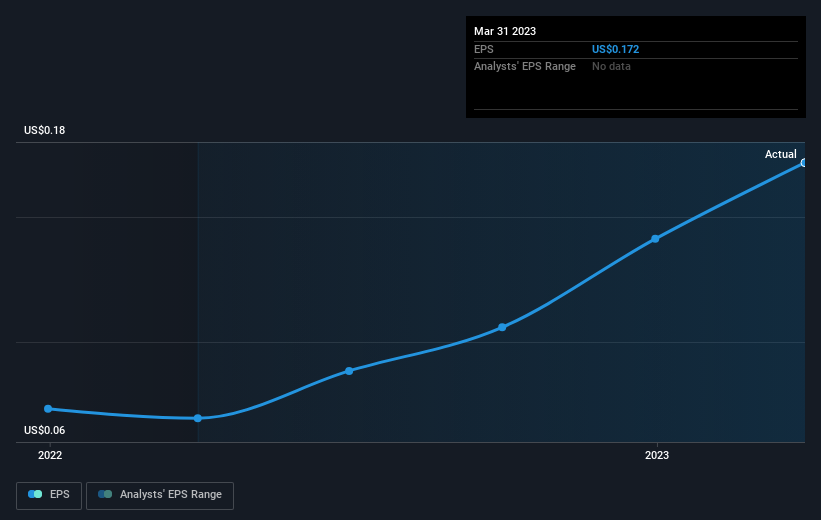- Israel
- /
- Electronic Equipment and Components
- /
- TASE:NXSN
NextVison Stabilized Systems (TLV:NXSN) stock performs better than its underlying earnings growth over last year

When you buy shares in a company, there is always a risk that the price drops to zero. But when you pick a company that is really flourishing, you can make more than 100%. For example, the NextVison Stabilized Systems, Ltd. (TLV:NXSN) share price had more than doubled in just one year - up 151%. On top of that, the share price is up 58% in about a quarter. This could be related to the recent financial results, released recently - you can catch up on the most recent data by reading our company report. We'll need to follow NextVison Stabilized Systems for a while to get a better sense of its share price trend, since it hasn't been listed for particularly long.
Since it's been a strong week for NextVison Stabilized Systems shareholders, let's have a look at trend of the longer term fundamentals.
Check out our latest analysis for NextVison Stabilized Systems
To paraphrase Benjamin Graham: Over the short term the market is a voting machine, but over the long term it's a weighing machine. One way to examine how market sentiment has changed over time is to look at the interaction between a company's share price and its earnings per share (EPS).
During the last year NextVison Stabilized Systems grew its earnings per share (EPS) by 147%. The similarity between the EPS growth and the 151% share price gain really stands out. So this implies that investor expectations of the company have remained pretty steady. It makes intuitive sense that the share price and EPS would grow at similar rates.
You can see how EPS has changed over time in the image below (click on the chart to see the exact values).

It might be well worthwhile taking a look at our free report on NextVison Stabilized Systems' earnings, revenue and cash flow.
What About Dividends?
When looking at investment returns, it is important to consider the difference between total shareholder return (TSR) and share price return. The TSR incorporates the value of any spin-offs or discounted capital raisings, along with any dividends, based on the assumption that the dividends are reinvested. Arguably, the TSR gives a more comprehensive picture of the return generated by a stock. We note that for NextVison Stabilized Systems the TSR over the last 1 year was 157%, which is better than the share price return mentioned above. This is largely a result of its dividend payments!
A Different Perspective
It's nice to see that NextVison Stabilized Systems shareholders have gained 157% over the last year, including dividends. A substantial portion of that gain has come in the last three months, with the stock up 58% in that time. Demand for the stock from multiple parties is pushing the price higher; it could be that word is getting out about its virtues as a business. I find it very interesting to look at share price over the long term as a proxy for business performance. But to truly gain insight, we need to consider other information, too. Take risks, for example - NextVison Stabilized Systems has 1 warning sign we think you should be aware of.
Of course NextVison Stabilized Systems may not be the best stock to buy. So you may wish to see this free collection of growth stocks.
Please note, the market returns quoted in this article reflect the market weighted average returns of stocks that currently trade on Israeli exchanges.
Valuation is complex, but we're here to simplify it.
Discover if NextVision Stabilized Systems might be undervalued or overvalued with our detailed analysis, featuring fair value estimates, potential risks, dividends, insider trades, and its financial condition.
Access Free AnalysisHave feedback on this article? Concerned about the content? Get in touch with us directly. Alternatively, email editorial-team (at) simplywallst.com.
This article by Simply Wall St is general in nature. We provide commentary based on historical data and analyst forecasts only using an unbiased methodology and our articles are not intended to be financial advice. It does not constitute a recommendation to buy or sell any stock, and does not take account of your objectives, or your financial situation. We aim to bring you long-term focused analysis driven by fundamental data. Note that our analysis may not factor in the latest price-sensitive company announcements or qualitative material. Simply Wall St has no position in any stocks mentioned.
About TASE:NXSN
NextVision Stabilized Systems
Develops, manufactures, and markets stabilized day and night cameras for ground and aerial vehicles.
Flawless balance sheet with solid track record.

